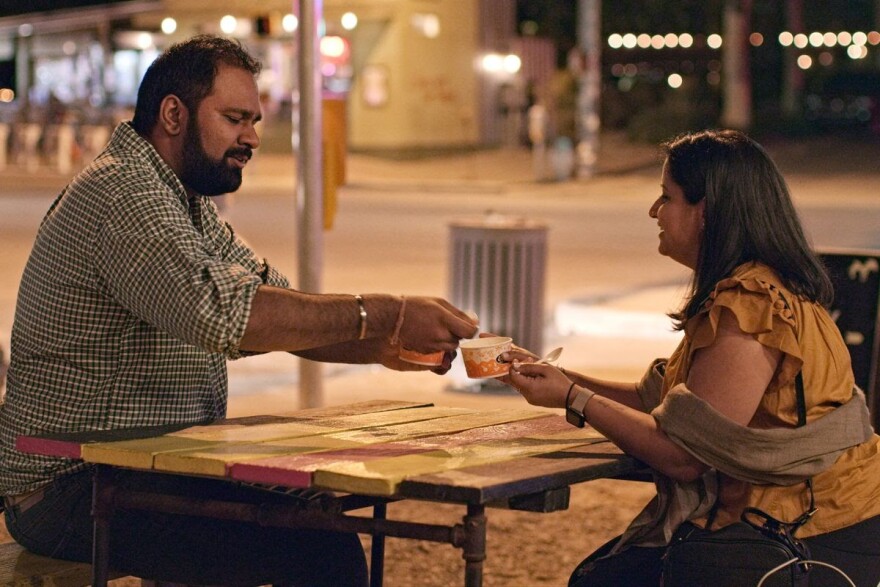In the new Netflix docuseries, “Indian Matchmaking,” affluent Indian singles look for love and marriage with the help of a professional matchmaker. Based on criteria they provide, clients are matched with ostensibly compatible dates, but they soon find that the goal of marriage is more difficult to attain that they had hoped — even with a matchmaker who consults biological data profiles, astrologers and face readers.
Does the addictively bingeable series provide an accurate look at the process of arranged marriage for Indians and Indian Americans in 2020? Host Anita Rao talks to Manisha Dass, one of the singles featured in the series; Jasbina Ahluwalia, founder and CEO of the South Asian matchmaking service, Intersections Match by Jasbina; and Keera Allendorf, associate professor of sociology and international studies at Indiana University Bloomington.
Five Things We Learned About Indian Approaches to Dating and Marriage
1. Indians Are Not A Monolith
Indians living in India approach marriage and dating differently than Indians living in the U.S. And Indians who have emigrated to the U.S. may treat the courtship process differently than Indians born in the U.S. The point is: there is no unilateral approach. Says Jasbina Ahluwalia, “The vision of partnership as well as one’s approach as to how to find a partner would then logically differ.”
Manisha Dass also notes the diversity. “I can see it in my own extended family. There's major differences in how people think about dating in the generations before me and definitely location as well.”
2. Caste And Color Still Matter
Even today, only 5% of Indians marry outside their caste in India. Income, education, profession, region, religion, parentage and skin color can all be deterrents when it comes to finding a suitable match.
Says Manisha Dass, “People have turned down matches with me or relationships with me, because my mom's Punjabi and my dad's Bengali. People will say, like: Oh no, you don't fit one caste or the other. [I] have been turned down by guys because of that reason and their families for that reason. So yeah, it’s definitely still prevalent.”
When it comes to how caste and color were discussed on “Indian Matchmaking,” Dass was optimistic. “These are extremely important topics. And I'm glad that the show didn't shy away from them. Change really is only going to happen if we can talk about the issues, and it's nice to see that this show has, you know, kind of sparked a lot of these conversations. For so long, it's been easier to kind of brush it under the carpet as a cultural sort of habit and not really talk about it, and it's really great to see that people are coming forward and having fun conversations about it.”
3. Professional Matchmakers Are Not As Common As Implied
According to Keera Allendorf, the glitzy world of professional matchmaking is not nearly as popular among Indian singles as “Indian Matchmaking” might lead viewers to believe. “Usually people are going through personal networks — family members, parents reaching out to others. At a wedding, you would see a lot of people coming together. So there can be a meeting and discussing and sort of evaluating who in the community is available. Matrimonial ads are also very common.”
The process is generally less formal and professionally orchestrated than it was on the show.
4. Fated Love Is A Highly Legitimate Concept
Astrologers were also consulted on “Indian Matchmaking.” Though not all modern Indian matchmakers use them, they are still fairly popular during the matching process.
"Historically, astrology was a common practice,” says Allendorf. “It's still practiced a lot today, although they'll just hope that it matches. And there's this idea that your spouse is fated. So since the time of birth, it's known who your spouse will be.”
5. “Indian Matchmaking” Was Not Actually About “Arranged Marriage”
Though she praises the Netflix docuseries for its “relatively unvarnished view,” Allendorf says that the processes of dating and turning down prospective partners seen in “Indian Matchmaking” is not consistent with what the practice of arranged marriage often looks like in India, which is a much briefer process with minimal deliberation and pushback.
She points out that marriage is more traditionally viewed in India, even now. “Marriage is the way that families continue, and the entire society is built around the continuity of family. Through marriage, you bring in a daughter-in-law, and a daughter-in-law’s most important job is to bring children. That continues the family. So it's about groups of families interacting rather than individuals interacting.”









